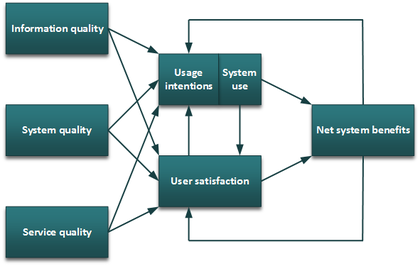This article needs additional citations for verification. (October 2016) |

The information systems success model (alternatively IS success model or Delone and McLean IS success model) is an information systems (IS) theory which seeks to provide a comprehensive understanding of IS success by identifying, describing, and explaining the relationships among six of the most critical dimensions of success along which information systems are commonly evaluated. Initial development of the theory was undertaken by William H. DeLone and Ephraim R. McLean in 1992,[1] and was further refined by the original authors a decade later in response to feedback received from other scholars working in the area.[2][3] The IS success model has been cited in thousands of scientific papers, and is considered to be one of the most influential theories in contemporary information systems research.
- ^ DeLone, W. H.; McLean, E. R. (1992). "Information systems success: the quest for the dependent variable". Information Systems Research. 3 (1): 60–95. doi:10.1287/isre.3.1.60.
- ^ DeLone, W. H. and McLean, E. R. (2002). Information Systems Success Revisited. Proceedings of the 35th Hawaii International Conference on System Sciences (HICSS), Big Island, Hawaii, 238-249.
- ^ DeLone, W. H.; McLean, E. R. (2003). "The DeLone and McLean Model of Information Systems Success: A Ten-Year Update". Journal of Management Information Systems. 19 (4): 9–30. doi:10.1080/07421222.2003.11045748. S2CID 3138489.